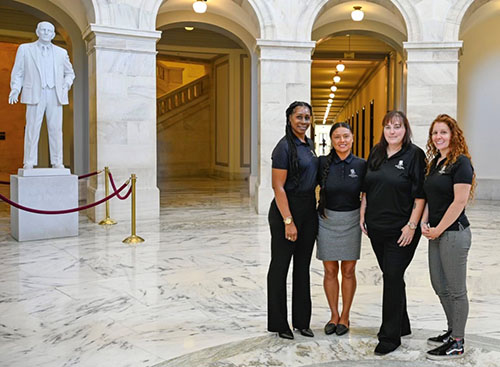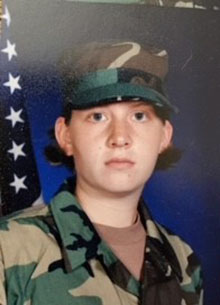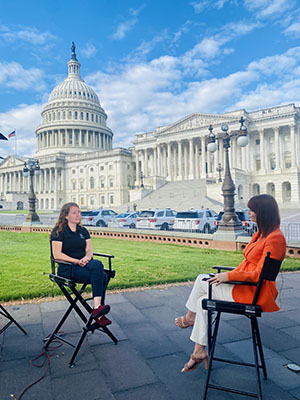A Woman Warrior’s Journey of Advocacy and Her Fight for Legislative Change

As a little girl, Rana Clark only had one career goal. She didn’t want to be a teacher, a doctor, or a princess. She wanted to be a soldier.
So, in 2005, at the age of 20, she made her dream come true and joined the U.S. Army. Unfortunately, it didn’t turn out quite like she’d imagined. Rana broke her hips during basic training. She was also sexually assaulted. The effects of those two traumas would impact the rest of her life.
“I love the military, but I am forever changed,” Rana said. “I will never be the same person.”
But she would also use that trauma as fuel for a mission to make things better for other service members and veterans. Through Wounded Warrior Project® (WWP), Rana has been able to share her story with public policymakers and help affect legislative changes that improve the lives of our nation’s veterans.
Building a Connection
Because of the severity of Rana’s injuries, her military career was cut short. Reintegrating back to civilian life was also a challenge.
“I got out, and I really, truly struggled,” Rana said. “I struggled for years.”

She was diagnosed with post-traumatic stress disorder (PTSD) almost immediately after getting out of the service.
When she first talked to the Department of Veterans Affairs (VA) about what happened to her in the military, she felt like she wasn't being heard. The frustration she felt in the aftermath of her service helped kickstart her advocacy efforts to improve care for veterans.
“I can't rightfully complain about a system or a service if I'm unwilling to do anything about it,” she said.
Going out and speaking openly about her experiences wasn’t something that came easy for Rana. After leaving the military, she would often isolate herself.
Through WWP, Rana was able to connect with other veterans, share experiences, and broaden her social circle. She also learned about WWP’s advocacy efforts and decided she wanted to get involved.
“Wounded Warrior Project had done so much for me,” Rana said. “They brought me back from really not wanting to live, to being at the point where I'm like, ‘OK, not only do I want to live, I want to give back.’”
Rallying Around Women Warriors
In September 2023, Rana, along with more than 50 other women warriors, attended the 2023 Women Warriors Summit in Washington, DC, to meet with legislators to advocate for issues affecting women veterans, including access to care, transition from military service, and financial wellness.
It was her third trip to the nation’s capital to advocate with WWP.

“I always look forward to meeting the amazing veterans that Wounded Warrior Project plans to get together and getting to put my advocacy hat on,” Rana said of attending these summits. “And hopefully, it makes an impact.”
The Women Warriors Summit focused on the needs of women veterans highlighted by WWP’s 2023 Women Warriors Report. Women are the fastest-growing veteran population and represent over 17% of warriors registered with WWP. To address issues and concerns unique to this growing population, WWP created the Women Warriors Initiative, aimed at helping empower women who served.
Because of the barriers she experienced post-military, Rana wants to see a better understanding of issues affecting women veterans and easier access and reliability of care and services.
"We're different than men, and I think our different needs to be taken into consideration,” she said.
By attending the summits in Washington and addressing her local and state legislators about veteran issues, Rana feels like advocacy has given her back the purpose she was seeking when she first joined the Army.
“I've always had a heart for my community. That's why I wanted to be in the military – because I wanted to serve,” Rana said. “I felt like this was a really good opportunity for me to do that again.”
Making Your Voice Heard
WWP offers opportunities for warriors to have a voice on the issues affecting them through Operation Advocacy, which connects warriors with elected officials in Washington, DC. Warrior Advocacy Leaders (WALs), like Rana, then meet with Congressional leaders to advocate for legislation to improve services and support for veterans.
WWP’s advocacy efforts have focused on toxic exposure, mental health, and women veterans, among others. Rana encourages other warriors to get involved if possible and recognize the power of their voices. Someone can read about veteran issues but hearing it directly from a service member or veteran can carry a lot of weight.
"Just pick up the phone, go by your local legislator's office. If there's an issue that you find that's frustrating, say something,” she said. “They can't make any real changes unless they're made aware of it.”
There’s also strength in numbers.
“I think that it's important that we all band together because we're so much stronger when we're together,” Rana said.
WWP’s mission is to honor and empower wounded, injured, or ill post-9/11 service members, veterans, and their families through life-changing programs and services. As part of the process, WWP advocates for veteran policies and initiatives that make a real difference, improving the lives of millions of veterans, family members, and caregivers.
“I'm very proud to be a part of the Wounded Warrior Project’s advocacy process,” Rana said. “It is a humbling experience to go and to just walk those historic halls and just feel like if I leave this Earth tomorrow, I can at least say that I attempted to make and leave my impact on this world.”
Learn more about WWP’s legislative priorities.
Contact: — Paris Moulden, Public Relations, pmoulden@woundedwarriorproject.org, 904.570.7910
About Wounded Warrior Project
Since 2003, Wounded Warrior Project® (WWP) has been meeting the growing needs of warriors, their families, and caregivers — helping them achieve their highest ambition. Learn more.